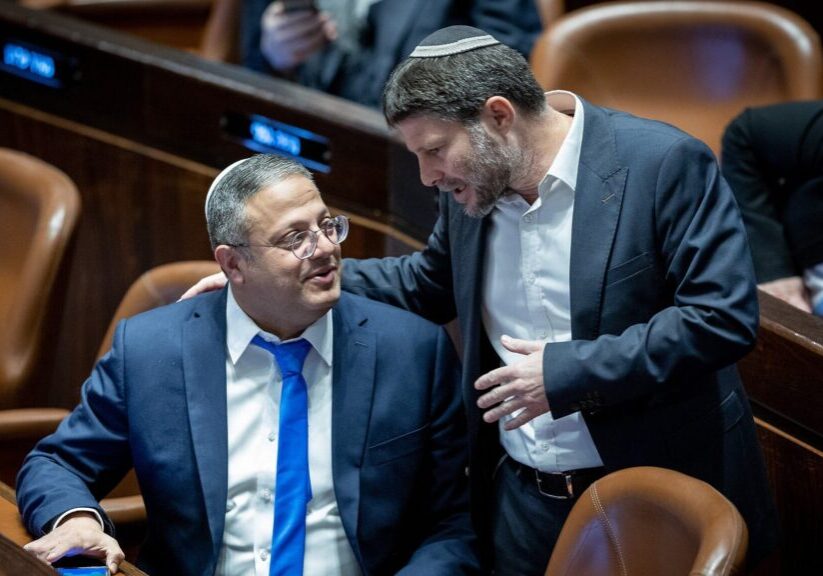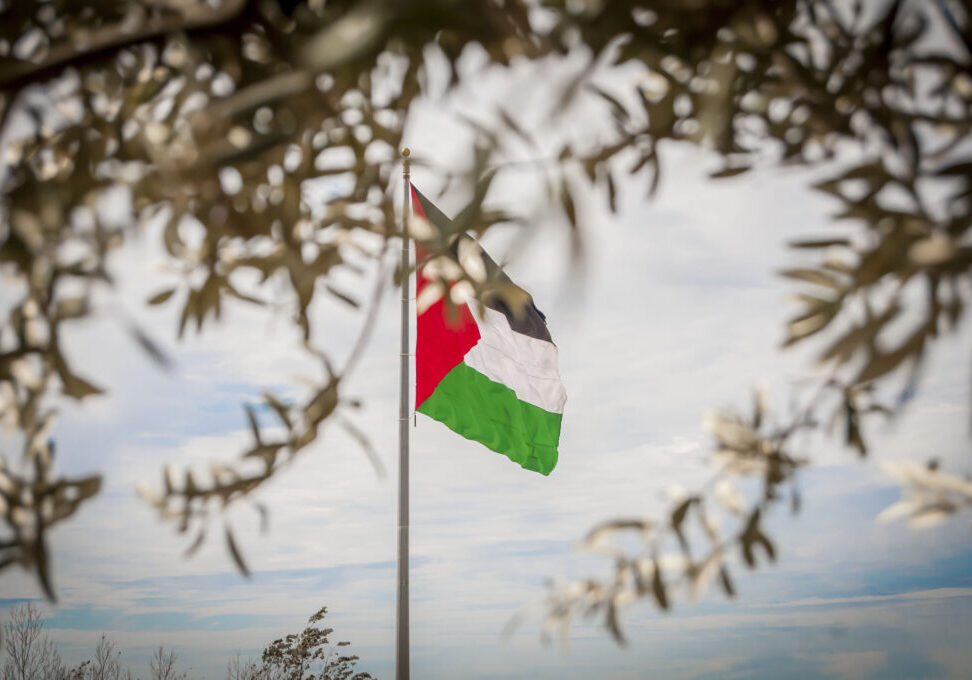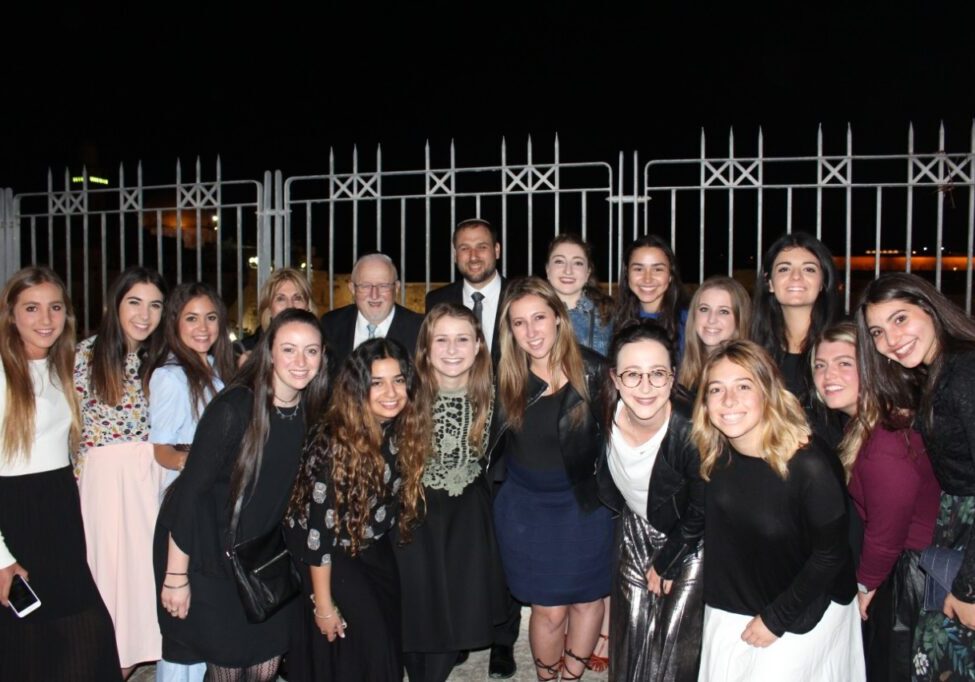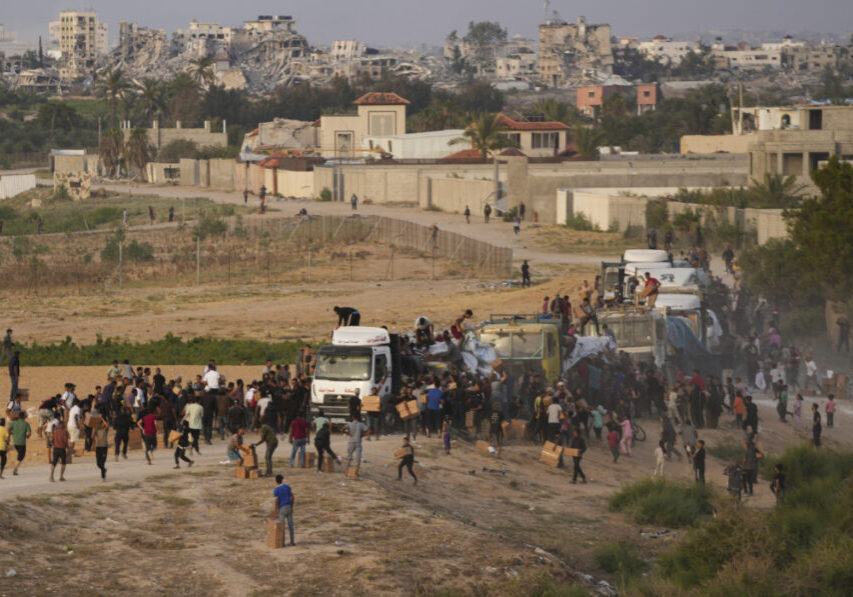Australia/Israel Review
Noted and Quoted – October 2019
Oct 6, 2019 | AIJAC staff
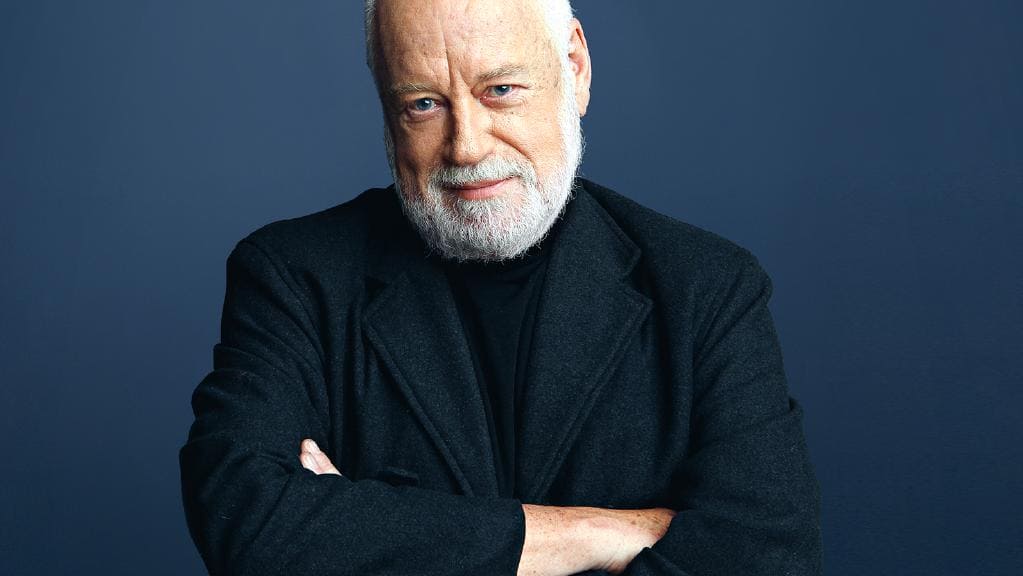
Phillip Adams’ lobby hobby
ABC Radio National “Late Night Live” (Aug. 5) listeners were exposed to Phillip Adams’ long-standing Israel obsessions during an interview with US academic John Mearsheimer – the co-author of a controversial book in 2007 called The Israel Lobby and U.S. Foreign Policy, which evolved out of an earlier paper that was accused of including classic antisemitic tropes.
The nominal topic of discussion was the fragmentation of the post-World War II international political order and the horror felt by the US intelligence and defence services, which Mearsheimer termed the “deep state”, at Donald Trump winning the US Presidency.
Adams asked if “the Israel lobby…[is] part of the deep state?”
Mearsheimer said no, explaining “The Israel lobby is basically, you know, a loose coalition of individuals and organisations that go to great lengths to push American foreign policy in a pro-Israel direction.”
An excitable Adams, who said he “admired” Mearsheimer’s “efforts” on the “Israel lobby”, ploughed on – suggesting Israel’s Mossad was in cahoots with the CIA to influence US foreign policy.
Here too, Mearsheimer demurred, saying the “Mossad is not the Israel lobby. Mossad is an intelligence agency in Israel” but the pro-Israel lobby in the US is “comprised of American citizens” and is the equivalent to other interest groups like the “farm lobby or the Cuba lobby”.
Adams then shifted gears to another pet obsession, US evangelicals who support Israel.
Mearsheimer said “it’s important to understand the Israel lobby is not the Jewish lobby, it’s an Israel lobby that does not include all Jews and includes lots of Christians.”
Adams then had a go at President Trump appointing his son-in-law Jared Kushner as Middle East envoy to develop a peace plan for the Palestinian-Israeli conflict.
Barns on drugs
Columnist Greg Barns never misses an opportunity to drop in a kick at Israel, even when it is completely irrelevant and gratuitous.
Opposing the war on drugs in a recent column, Barns cited a new book on the topic by Antony Lowenstein, who he said is “an Australian journalist who has previously bravely taken on the Zionist supporters of apartheid Israel”.
Making Loewenstein out to be a brave free speech activist who placed himself in danger because of his anti-Israel views is a little far-fetched.
Loewenstein exercised his right to free speech in a country where he was able to do so, managed to get numerous facts wrong in the process, and yet Australian media outlets – including the ABC and former Fairfax newspapers – lapped up his anti-Israel smears.
Moreover, calling the war on drugs futile and advocating treating drug users as people suffering from a medical problem is hardly original, Mercury (Sept. 16).
Playing eye spy
An SBS TV “World News” (Sept. 13) report on anonymous allegations that Israel was identified by the FBI as the source of electronic spy equipment in Washington DC – claims which more recent evidence suggests are almost certainly wrong – included an assertion that “there is evidence Israel has spied on the US in the past. In 2006, a former US Department of Defence employee was convicted of passing classified documents on US policy towards Iran to Israel.”
There is no evidence that the US Department of Defence employee in question was an Israeli spy. He himself said he acted to pass on the information without being asked and that his Israeli contact told him far more information than what he shared with the Israeli, SBS TV “World News” (Sept. 13)
Student Mis-Orientation
An SBS website news story (Sept. 4) entitled “Palestinian student barred from entering US back at Harvard” stated in the intro, “A 17-year-old star student from Palestine has arrived in Harvard just in time for classes to start after he was initially stopped from entering the US.”
All available reporting from other sources suggests it is false to claim that the student in question, Ismail Ajjawi, is from Palestine or that he travelled to the US from Palestine.
The only other reference to Ajjawi coming from “Palestine” arising from searching international media sites and newspapers is a headline of an Al Jazeera News article which stated “Harvard University student from Palestine denied US entry”.
The text of the Al Jazeera News article itself did not claim Ajjawi is from Palestine.
On all available evidence, Ajjawi was born and raised in Lebanon. The LA Times (Aug. 27) reported that “Ismail Ajjawi made headlines in Lebanon as a 14-year-old growing up in a ramshackle camp for Palestinian refugees.” The New York Times (Aug. 27) described Ajjawi as “a Palestinian student from Lebanon” and said he is “a resident of Tyre, Lebanon.” Even Lebanon’s main English language newspaper The Daily Star (Sept. 4) talked about “Ismail Ajjawi, a 17-year-old student residing in south Lebanon’s Tyre” and made no reference to him being “from Palestine”. AIJAC has lodged a complaint asking SBS to correct the report.
Meanwhile, SBS’ ombudsman had upheld an AIJAC complaint arguing that a “World News” TV report (July 10) falsely claimed Israeli PM Binyamin Netanyahu had threatened military action against Iran after the latter announced it was increasing its uranium enrichment, as detailed in August’s “Noted and Quoted”.
Designated driver
Three SBS TV “World News” reports on the increase in tensions between Hezbollah and Israel following the latter’s nomination as the most likely source for two drones that went down in Beirut, hitting Hezbollah assets, seemed to normalise or misidentify the Lebanese terror group.
Omar Dabbagh’s Aug. 26 story spoke of “Hezbollah, which Israel has deemed a terrorist group.”
Dabbagh’s report the next day called Hezbollah “a political bloc in Lebanon which Israel deems a terrorist group.”
Then, on Sept. 3, Gary Cox’s story said “Israel considers Hezbollah a terrorist group.”
Dozens of countries and political groupings besides Israel have designated all or part of Hezbollah a terrorist group, including Australia, New Zealand, the US, Canada, Japan, Argentina, the European Union’s 28 member states and all but two of the Arab League’s 22 members, one of which is Lebanon and the other Syria.
Moreover, calling Hezbollah “a political bloc” without providing any other context is extremely misleading. Political blocs do not have usually their own large private army or admit they take orders from a foreign government, in this case Iran.
UN Security General Antonio Guterres has repeatedly called on Hezbollah to disarm as required under UN Security Council Resolution 1701, noting that it “continues to restrict the ability of the Government of Lebanon to exercise full sovereignty and authority over its territory.”
Of course, Hezbollah does have significant political representation in the Lebanese Parliament and the Government, but this is in large part a consequence of its military power, which it uses to force its agenda on Lebanon.
Unholy row
“Palestine” being given as the nine-letter solution for the clue, “The Holy Land” in Nine Newspapers’ “Quick Crossword” on Sept. 3 raised eyebrows and media inquiries.
AIJAC’s Colin Rubenstein told the Australian Jewish News (AJN) that “the real puzzle is why someone has asked a question and given a wrong or, at best, incomplete answer. More seriously, the link between the Holy Land and the name Palestine only begins after 134 CE when the Romans renamed ancient Israel as Palestine in an attempt to expunge its Jewish identity. The profound historical and religious events mentioned in the Jewish and Christian traditions would have taken place before then when it was Israel and Judea. In fact, the word Palestine never even appears in the Christian Bible. So at the very least, the answer should have included a reference to Israel.”
The AJN quoted Sydney Morning Herald editor Lisa Davies saying, “the crosswords are provided by an external contractor (they’re not done in-house) so I wasn’t aware of this. We are making inquiries about this immediately” and issued a statement “apologis[ing] for any offence caused”. Andrew Bolt raised the faux pas on his Sky News program later that night.
A bitter taste
A review in the Age’s “Good Food supplement” (Aug. 20) said a restaurant “serving Israeli street-food, has recently undergone a name change from Colours to Lomah (Land of Milk and Honey, a poetic name for the land Israel now occupies).”
This is at best a clumsy way to describe the State of Israel. The phrase “Land of Milk and Honey” originates from the Jewish Bible where it is repeated dozens of times and explicitly refers to ancient Israel. Indeed, in Western civilisation use of the term is directly descended from that source and understood to mean the ancestral Jewish homeland.
Iran doesn’t give a ship
In a clear-eyed analysis of Iran’s recent attacks on tankers in the Persian Gulf, the Australian Financial Review (Sept. 17) editorialised that “it is also in keeping with Iran’s practice of talking peace and war at the same time. Iranian Foreign Minister Mohammad Javad Zarif attended the G7 meeting in Biarritz, with French President Emmanuel Macron keen to broker a revival of the collapsed nuclear deal with the US, Europe, Russia and China. But the Iranians agreed with Britain not to deliver an oil shipment to Syria after an Iranian tanker was arrested in Gibraltar for breaching sanctions, then promptly broke the deal. And there is Iran’s hostage diplomacy, with the revelation in the past week that two travel bloggers and an academic, all with Australian citizenship, are detained in the country.”
The paper suggested Iran’s rationale for its actions was to “widen” and “escalate” the conflict and “put pressure on Iran’s antagonists to ease off on sanctions or reopen talks.”
Walker stretches
Nine Newspaper columnist Tony Walker (Aug. 26) warned that Australia’s decision to join the US-led naval exercise Operation Sentinel to protect international shipping in the Persian Gulf risked dragging us into an open-ended commitment and a repeat of the 2003 US invasion of Iraq.
Walker lamented President Trump’s decision to leave the 2015 nuclear deal, calling it the “Iran peace plan” and claiming “It may not have been perfect, but it was working.”
Former Liberal opposition leader John Hewson ran a similar line to Walker in the Canberra Times (Aug. 30).
But in a published response to Walker in the Age (Sept. 5) AIJAC’s Ahron Shapiro said, “Ensuring the free passage of the significant portion of Australia’s oil supply which is shipped through the Persian Gulf’s narrow Strait of Hormuz is obviously in our national interest.”
He also noted that defenders of the nuclear deal, “largely ignore Iran’s violations of the agreement, including maintaining a secret nuclear archive of weapon development research hidden from the International Atomic Energy Agency.”
Shapiro dismissed the allusion to the Iraq war, noted its goal was regime change and called attention to President Trump’s numerous statements advocating a renegotiation of the deal and opposing war with Iran or regime change.
Bend it like Behnam
AIJAC guest Behnam Ben Taleblu – a senior analyst at the Foundation for the Defence of Democracies in Washington – commented widely in the media on the importance of Australia’s contribution to the success of Operation Sentinel.
But he also argued for Australia to follow through on its commitment in December 2018 to update its policy in response to future Iranian violations of the nuclear deal.
According to Ben Taleblu, “in 2019 alone, Iran thrice intentionally violated the accord”, listing “installing more advanced centrifuges…continuing to flight-test ballistic missiles – some of which can carry a nuclear warhead – in contravention of UN Security Council Resolution 2231” and the reports in September that “the IAEA (the international body tasked with monitoring Iran’s nuclear program) found traces of uranium at Turquzabad, home to the ‘atomic warehouse’ Israel shined a light on over a year ago… Iran is yet to offer an official reason as to why this material was found at Turquzabad,” Spectator Australia (Sept. 13).
The revelation that three Australian citizens were being held hostage in Iran’s notorious Evin prison on flimsy accusations of spying, elicited media requests for Ben Taleblu’s insights on how Australia might secure their release.
Taleblu told ABC TV “World Today” (Sept. 13), “Australia should push for the Iranian [government] to put the narrative they have within the country about the reason for the arrests, the exact law that they may have transgressed into the public spotlight and have the court of public opinion also press the Islamic republic.”
He said it “may not make much sense to do this, but then if you look at the broader history of how the Islamic Republic has treated these foreign nationals/dual nationals who they take on often trumped-up charges, then you see a pattern, and raising that pattern in the court of public opinion in international institutions would aid Canberra significantly.”
He also talked about the hostages to ABC Radio “PM” that same day.
A passage to Iran
On ABC Radio National “Breakfast” (Sept. 12), ANU Distinguished Professor Amin Saikal demurred from the description of the Australian nationals as “hostages”.
According to Saikal, calling them “hostages” is “an exaggerated interpretation” because Australia has a good relationship with Iran.
Revealingly, he said he had made “umpteen” trips to Iran and never had any problems despite being critical of the government’s actions in Syria.
Meanwhile, Saikal’s Centre for Arab and Islamic Studies reportedly received an endowment of $350,000 from the Iranian government.
High seas, higher principles
Former Australian Foreign Minister Alexander Downer endorsed the Morrison Government’s commitment to Operation Sentinel saying it isn’t fair to ask only Americans to ensure freedom of navigation.
He also ridiculed the principle that underpinned the Iran nuclear deal, writing, “the Western powers offered sanctions relief if the Iranians ceased their nuclear program for 10 years. Well, Iran shouldn’t be building nuclear weapons; full stop. To do so would be an abrogation of their commitments under the Nuclear Non-proliferation Treaty. They shouldn’t be bribed to uphold international law. They should apply the law,” Australian Financial Review (Aug. 26).
Elsewhere, Australian Strategic Policy Institute analyst Malcolm Davis argued for Australian participation as being in our national interest.
Dr Davis wrote, “Australia is woefully underprepared in terms of fuel security, and successive governments over past decades have consistently ignored their international obligations to have at least a 90-day supply of fuel – we currently have 28 days. Now, with the risk posed by Iran to interfere with commercial shipping, including energy supplies, the threat of an interruption to our energy security forces government to find a way to ensure supply.
“Related to that is the importance of strengthening our alliance with the US. With the Prime Minister off to Washington for dialogue with the Trump Administration, this is uppermost in the minds of policy thinkers,” he added, Daily Telegraph (Aug. 21).
The Australian editorialised (Aug. 22) its support for the move, noting that “Germany and other European nations, however, have stubbornly and foolishly refused to join the mission, largely because they hope to revive the flawed 2015 nuclear treaty struck with Iran by Barack Obama.”
Low blow
The Age (Aug. 21) warned Operation Sentinel was “even less advisable in some ways than the invasion of Iraq” because the US is overstretched. The paper doubted whether Australian participation would be genuinely appreciated by President Trump “who has behaved capriciously to other traditional allies”.
The anti-Trump jibe by the Age is not consistent with recent history. The White House announced on July 22 that President Trump would give PM Morrison a state dinner on Sept. 20 during his visit to Washington DC, a rare honour for a foreign leader which Trump has only given once before.
Indeed, on Sept. 20, Age/Sydney Morning Herald Washington correspondent Matthew Knott confirmed the significance of the achievement, writing, “The fact Morrison is only the second leader to receive the honour shows how isolated Trump has become from traditional US allies – and how well Australia has fared by comparison.”
Knott noted Lowy Institute head Michael Fullilove’s view that “Morrison’s visit allows Trump to reassure Americans that he has not completely up-ended America’s alliances… ‘The administration is pulling out all the stops to show that Trump can get along with another western leader,’ Fullilove says.”
Tags: Australia, Media/ Academia


